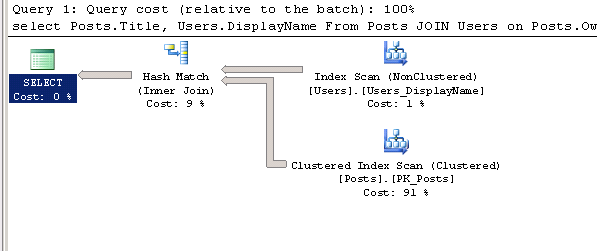I am starting to learn execution plans and am confused about how exactly a hash match works and why it would be used in a simple join:
select Posts.Title, Users.DisplayName
From Posts JOIN Users on
Posts.OwnerUserId = Users.Id
OPTION (MAXDOP 1)

As I understand it the results of the Top index scan become the hash able and each row in the bottom Index clustered scan is looked up. I understand how hash tables work to at least some degree, but I am confused about which values exactly get hashed in an example like this.
What would make sense me is the the common field between them, the id, is hashed -- but if this is the case, why hash a number?
